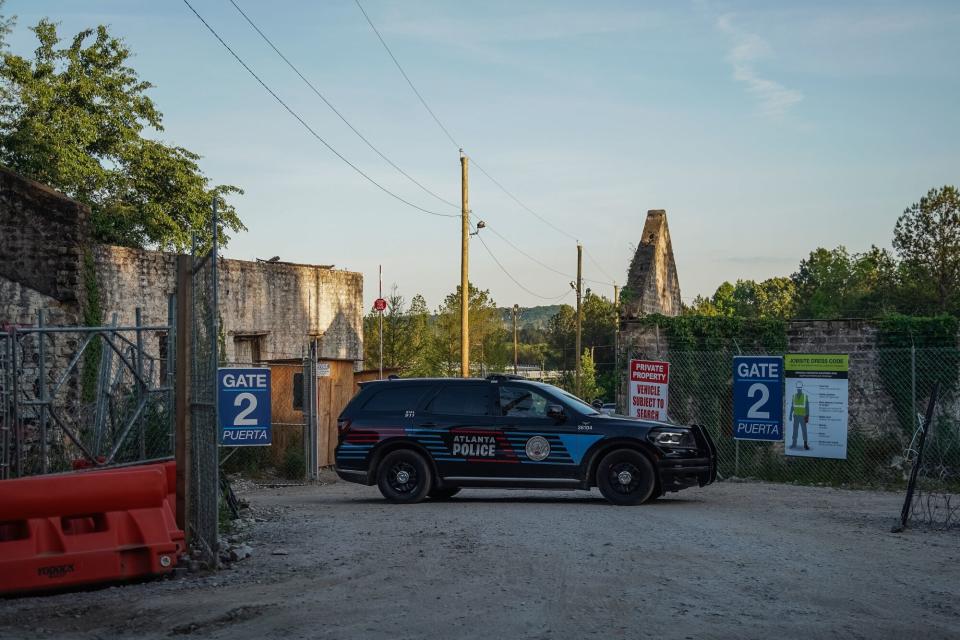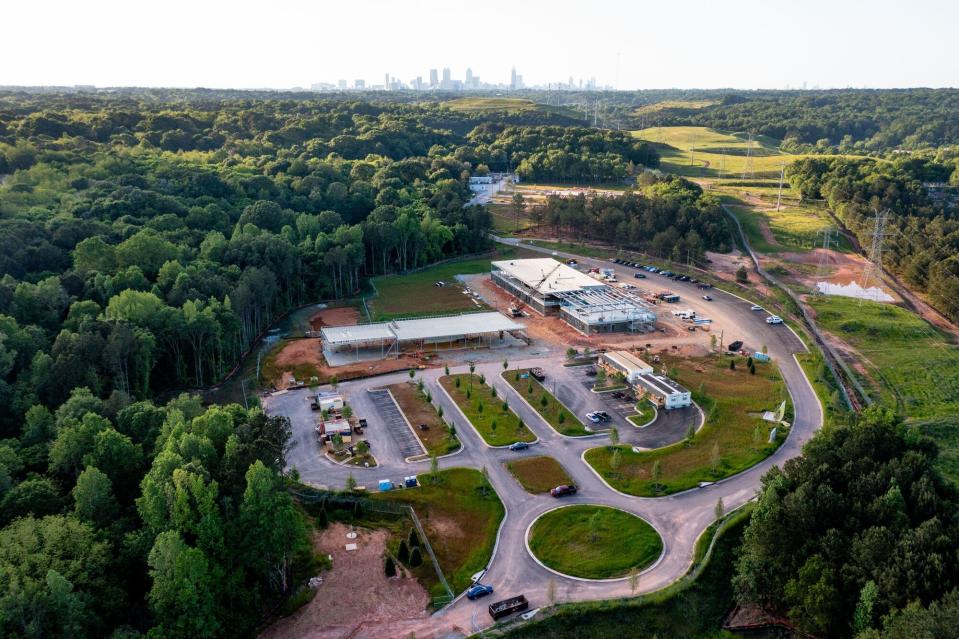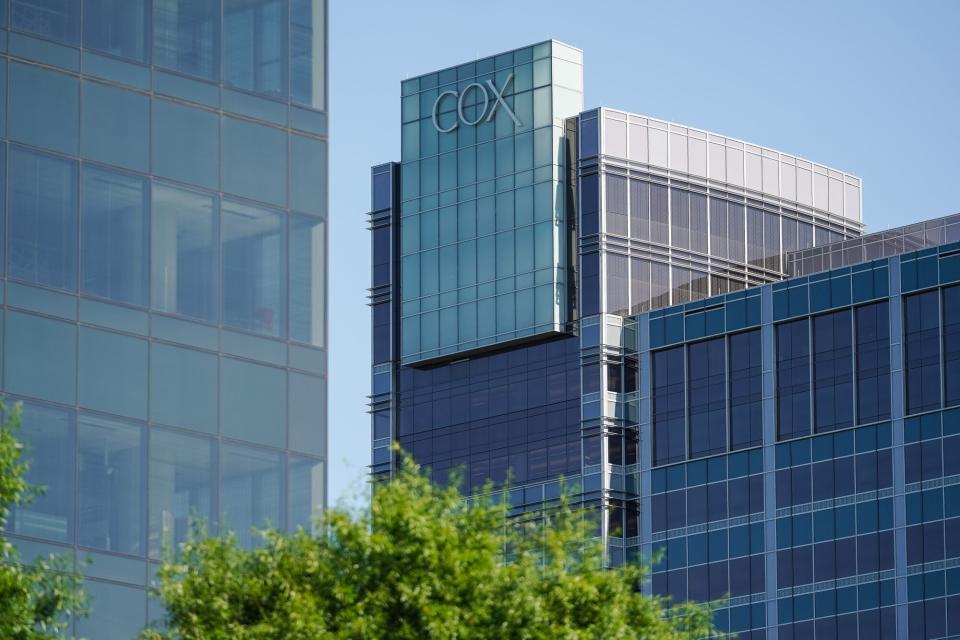Heirs to $35 Billion Fortune Face Off Over Atlanta's Controversial ‘Cop City’
(Bloomberg) -- Alexander Cox Taylor is the fourth-generation scion of a dynasty valued at $35 billion. He runs the family conglomerate, Cox Enterprises Inc., while supporting civic causes in his hometown of Atlanta, including a new $110 million facility to train police and other safety officials.
Most Read from Bloomberg
Trump Vows ‘Day One’ Executive Order Targeting Offshore Wind
Putin Names Economist as Defense Minister in Surprise Reshuffle
Global Chips Battle Intensifies With $81 Billion Subsidy Surge
His first cousin, James Cox Chambers Jr., is using his own piece of the fortune to try to shut that very project down. Fergie, as he’s known to his family, is fervently against what he and other opponents deride as Cop City. A community organizer and self-proclaimed Marxist, Chambers for a time had an ACAB tattoo on his neck — an acronym for “All cops are bastards.”
The dueling dollars over the Atlanta training center reflect an unprecedented rupture in a family that Bloomberg has ranked as the world’s 21st-richest. The clan with a long history of supporting widely palatable initiatives and mainstream political candidates now has one of their own lobbing counter-efforts in service of his grandiose vision for dismantling capitalism and its trappings.
Chambers’ activism — heavy on spectacle, haphazard in its execution — has thrown sand in the gears of the Atlanta project. And his financial resources were recently supercharged when he reached an agreement with Taylor to cash out his stake in Cox Enterprises, giving Chambers an initial payment of $250 million, with more to come.
Derailing the training center is a long shot, but Chambers is committed to last-ditch efforts — and, in turn, to thumbing his nose at the genteel relatives from which he is estranged.
“The mechanisms that allow my family to be one of the most powerful families in Atlanta, if not Georgia, are the mechanisms behind Cop City,” Chambers said in a telephone interview from Tunisia, where he has resided for several months. “It’s designed to create a society that’s further dominated by the bourgeoisie. It’s ruling class population control.”
The Cox family is a paragon of old money and society, especially in Georgia, where their company is headquartered and has wielded power since 1939. That’s when the cousins’ great-grandfather, James Middleton Cox — the 1920 Democratic nominee for US president — purchased the Atlanta Journal newspaper to add to what would become a vast array of media, telecommunications and automotive businesses.
Institutions across Georgia’s largest city bear the family name, including spaces at Emory University and the Atlanta History Center. Taylor, 49, is active in the Rotary Club and sits on numerous boards.
One of his civic pursuits is the Atlanta Public Safety Training Center, now under construction on an 85-acre patch of land on the city’s outskirts. As chair of the Atlanta Committee for Progress, Taylor led an effort to raise $60 million in private dollars to fund the project. His company’s philanthropic arm, the James M. Cox Foundation, donated $10 million to a nonprofit that the city has partnered with for financing.
Atlanta, like other big US cities, saw an increase in some types of violent crime after the onset of the pandemic, highlighting a need to hire more police officers and better train them. But distrust of police also reached a peak after the May 2020 murder of George Floyd put law-enforcement tactics under greater scrutiny.
Taylor, when announcing his support for the police training facility in 2021, said the investment "will help our city move faster in fighting crime." He declined to comment for this story.
A Cox Enterprises spokesperson, Natalie Giurato, said that Taylor led the effort to raise the money for the public safety training center because as a local executive, “it was his turn” to chair the group that provided key funding. Since then, she said, “Alex has been pretty quiet on the issue.”
The project became the subject of demonstrations and confrontations. “We were working our plan to build this thing, and then once we got our permits, people who are violent and pretty noisy” started protesting against it, said Atlanta Mayor Andre Dickens. “These are people who fight oil rigs, gas pipelines, and any kind of police facilities.”
Chambers was drawn into the saga when one such incident ended with police officers killing a 26-year-old activist, Manuel Esteban Paez Terán, who allegedly fired a gun at them and wounded a state trooper. An autopsy found Paez Terán was shot at least 57 times.
When the protester “was murdered in the forest, and I found out that my family had been a primary funder” of the project, Chambers said, “It made me feel more of a mandate to get involved in opposition funding.”
Chambers, 39, said that he has provided more than $1 million to fight the project.
Construction has been underway for months, with initial occupancy planned for later this year. But Chambers hasn’t given up his opposition — and his agreement to liquidate his stake in Cox has given him more resources than ever to promulgate it.
He is bound from discussing the terms, but Chambers said he “sold out” of the company in a deal that provides him with “several hundred million” dollars over time.
“It was something I thought about for years, and went back and forth with Alex about,” Chambers said. “The whole point” of taking the money, Chambers said, “was to disrupt the systems that put my family in power.”
Taylor and Chambers have taken divergent paths from equally privileged beginnings. Growing up, they both coveted the affection of their grandmother, Anne Cox Chambers, whose father founded the company in 1898. A supporter of Democratic politics, she served as ambassador to Belgium in President Jimmy Carter’s administration, and was a board member of Atlanta-based Coca-Cola Co.
She and her sister, Barbara Cox Anthony, co-owned Cox Enterprises for more than three decades. Before Anne Chambers died in 2020 at the age of 100, she gave each of her three children, including Taylor’s mother and Fergie Chambers’ father, a share of her 49% stake in the company.
While Taylor was growing up in Atlanta and going on to graduate from Nashville’s Vanderbilt University, Fergie Chambers was living in New York City with his mother, who had split from his father. Chambers attended Bard College, an elite liberal arts school in New York, though he never graduated. His grandmother served two terms on the school’s board, and his father now serves as its chairman.
The father and son have not spoken to each other in over two years, according to Fergie Chambers. “And we didn’t talk a ton before that,” he said. James Chambers Sr., 67, is a co-owner of the Atlanta Hawks basketball team. He did not respond to attempts to reach him through Bard or the Hawks.
Taylor started his career at one of the family’s small newspapers in Grand Junction, Colorado. He went on to a senior leadership role at Cox Media Group and ran field operations for Cox Communications, a broadband business.
He now leads the closely held Cox Enterprises, which has $23 billion in annual revenue and employs 50,000 people. It includes Cox Communications, now the largest private broadband provider in the country, and Cox Automotive, which houses brands such as Autotrader and Kelley Blue Book. The Cox Media Group, in which the company maintains a minority stake alongside controlling partner Apollo Global Management Inc., counts dozens of radio and television stations.
Chambers only briefly dabbled in the family business. He moved to Atlanta in his early 20s and entered a management training job at Manheim, a used-car auction business that is part of Cox Automotive. But after just a year on the job, he realized that climbing the corporate ladder was not for him.
Instead, Chambers found himself drawn to activism. In 2015, when a naked and unarmed man named Anthony Hill was shot and killed by a police officer in Georgia’s DeKalb County, Chambers thrust himself into the backlash, helping to organize public disruptions. He was arrested twice while staging protests, he said. He donated money to help protesters with transportation, contributed to bail funds to get them out of jail, and helped with legal costs. “I was very connected to the anti-police movement in Atlanta,” Chambers said.
Indeed, when Chambers operated a gym in Atlanta, it was infamous for not allowing police. Neighbors of land he owns in the Berkshires area of western Massachusetts reportedly have been fearful that a communist militia may be taking shape on his property — a suggestion Chambers has denied.
Chambers operates what he calls “a collective” of community organizations around the US that count on him for money. “Everyone in the collective is an organizer, but I’m the only one who was born rich,” he said.
He’s been orchestrating those efforts from Tunisia since he moved there last year to practice Islam. “I am Muslim,” he said. “I wanted to live in a Muslim country.” He is joined there by his wife Stella Schnabel, an actress and the daughter of artist Julian Schnabel, as well as their child.
Chambers is not only plowing his money into Atlanta. After Israel's invasion of Gaza following Hamas' October attacks, Chambers said that he has contributed over $1 million to Palestinian causes. When Chambers received a payment from the city of New York as part of settling a lawsuit with Black Lives Matter protesters who charged that they had been abused by police, he says he redirected his entire $24,000 settlement to pro-Palestinian groups.
The Atlanta public safety facility is being built on land that was once a prison farm and has long been a site for illegal dumping and a refuge for squatters and drug users. A contaminated river cuts through its dense woods.
A plan to restore the area includes hiking trails that will run from the training facility to nearby parks.
“Those who live around here are very much in support of the training facility,” said Alison Clark, an area resident who chairs a committee of community stakeholders for the training center.
Chambers said he decided that the anti-police movement needed more money than he had at this disposal. Since he was a young adult, he had received several “negotiated dividends” from Cox.
But early last year, he began pressing forward with his cousin, Taylor, to reach an agreement for him to cash out of the family business.
Even backed by more money, Chambers’ bid to stop the project faces significant hurdles.
Chambers said he gave $600,000 last year to two groups involved in the stop Cop City effort. That included funds to help gather signatures for a ballot measure aimed at blocking the project.
More than 100,000 signatures were collected, but an analysis by media organizations found that many of them may not be legitimate. Even if the measure is found to have garnered enough valid signatures to get on the ballot, the city of Atlanta has argued in court documents it is invalid for other reasons, and it’s hardly clear voters favor halting the development.
In 2023, over 60 activists were charged under the state’s anti-racketeering law for their efforts to stop Cop City.
The protesters’ approach often appears designed more as a show of defiance than a genuine effort at political persuasion.
In February, Cop City protesters gathered in Tucson, Arizona, for what was billed as a national summit to stop the facility. Local news reports said three people with ties to the protest were arrested for rioting and arson after two bank branches were vandalized. Activists had sought to call attention to corporations they say have financial connections to the project.
Andrew Morse, publisher of the Cox Enterprises-controlled Atlanta Journal-Constitution, recently wrote in the newspaper’s opinion pages that “We need the new public safety training center.”
Meanwhile, the Atlanta Community Press Collective, a scrappy online outlet, now routinely gives voice to those fighting to stop Cop City. The nonprofit website has received $350,000 in funding from Chambers’ collective, according to editor Matt Scott.
Most Read from Bloomberg Businessweek
©2024 Bloomberg L.P.





